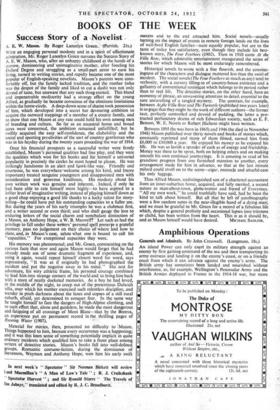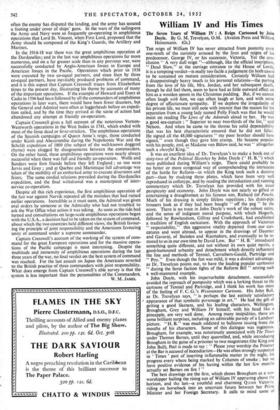Amphibious Operations
Generals and Admirals. By John Cresswell. (Longmans. 18s.) AN island Power can only exert its military strength against an enemy by first gaining command of the sea and then transporting its army overseas and landing it on the enemy's coast, or on a friendly coast from which it can advance against the enemy's army. The British army has sometimes been landed and nourished without interference, as, for example, Wellington's Peninsular Army and the British Armies deployed in France in the 1914-18 war, but more often the enemy has disputed the landing, and the army has secured a footing under cover of ships' guns. In the wars of the sailing-era the Army and Navy were so frequently co-operating in amphibious operations that Lord St. Vincent, when First Lord, proposed that the Army should be composed of the King's Guards, the Artillery and Marines.
In the 1914-18 war there was the great amphibious operation at the Dardanelles; and in the last war amphibious operations far more numerous, and on a far greater scale than in any previous war, were successfully conducted by Anglo-American forces in Europe and American forces in the Pacific. Operations which prior to 1938 were executed by two co-equal partners, and since then by three co-equal partners, have inevitably produced problems of command, and it is this aspect that Captain Cresswell traces from Elizabethan times to the present day, illustrating his theme by accounts of many of the important operations. If the example of Howard and Essex at Cadiz in 1596 had been followed by all the commanders of amphibious operations in later wars, there would have been fewer disasters, but the General and Admiral were often at loggerheads before an expedi- tion sailed, and by the time they arrived at the scene of action had abandoned any attempt at friendly co-operation.
Captain Cresswell gives a full account of the notorious Vernon- Wentworth operations in the West Indies in 1741, which ended with most of the force dead or fever-stricken. The amphibious operations of the Spanish campaigns of Queen Anne's reign, those conducted under Keith and Abercrombie during the Napoleonic War and the Scheldt expedition of 1809 (the subject of the well-known doggerel rhyme) were clogged by disagreements between the commanders. On the other hand, these amphibious operations were nearly always successful when there was full and friendly co-operation. Wolfe and Sandars were firm friends before they left England ; so too were Jervis and Grey ; and at Quebec and Martinique full advantage was taken of the mobility of an embarked army to execute diversions and feints. The same cordial relations prevailed during the- Dardanelles expedition, and the final withdrawal was a masterpiece of inter- service co-operation.
Despite all this rich experience, the first amphibious operation of the last war against Narvik repeated all the mistakes that had ruined earlier operations. Incredible as it must seem, the Admiral was given oral orders by someone at the Admiralty who had not troubled to ask the War Office what action it was taking. As soon as the tide had turned and consultations on large-scale amphibious operations began with the U.S.A., a decision had to be taken on the system of command, about which the two countries held different views, the British favour-. ing the principle of joint responsibility and the Americans favouring unity of command under a supreme -commander.
Captain Cresswell's account of the working of the system of com- mand for the great European operations and for the massive opera- tions of the Pacific campaign is most interesting. Despite the multitude and immensity of amphibious operations during the last three years of the war, no final verdict on the best system of command was reached. For the last assault on Japan the Americans reverted to the British practice of three commanders with joint responsibility. What does emerge from Captain Cresswell's able survey is that the system is less important than the personalities of the Commanders.
W. M. JAMFS.



































 Previous page
Previous page